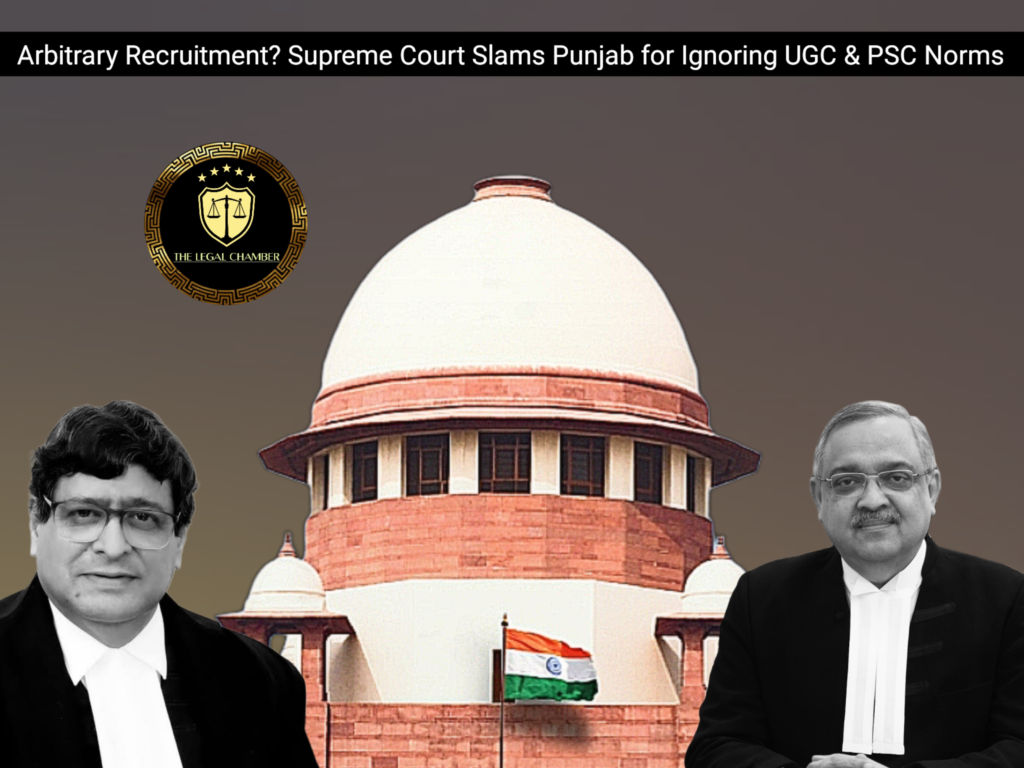
The Supreme Court ruled that the Punjab government’s recruitment of Assistant Professors and Librarians violated constitutional and statutory norms. The Court held that the State failed to consult the Punjab Public Service Commission as mandated under Article 320(3)(a) and disregarded UGC Regulations 2010, which were binding. The retrospective amendment to exclude these posts from the Commission’s purview was deemed illegal. The selection process, based solely on a written test without interviews or academic evaluation, was found arbitrary under Article 14. The Court quashed the appointments, directing fresh recruitment in compliance with UGC Regulations 2018.
Facts Of The Case:
In January 2021, the Punjab government sent requisitions to the Punjab Public Service Commission (PPSC) to fill 931 posts of Assistant Professors and 50 Librarians in government degree colleges. Later, an additional 160 Assistant Professor and 17 Librarian posts were created for newly established colleges. On September 17, 2021, the state decided to fill these additional posts through Departmental Selection Committees instead of the PPSC, citing urgency. However, after a change in government on September 20, 2021, the entire recruitment process was abruptly altered. On October 9, 2021, the Higher Education Department decided to fill all 1,091 Assistant Professor and 67 Librarian posts through university-led selection committees, replacing the PPSC’s role.A hurried selection process was conducted, with advertisements issued on October 19, 2021, and exams held in November 2021. Results were declared on November 28, 2021, despite pending High Court challenges. The Punjab & Haryana High Court’s Single Judge quashed the recruitment in August 2022, citing violations of UGC norms and PPSC regulations. However, a Division Bench overturned this decision in September 2024. The Supreme Court, in its July 2025 judgment, reinstated the Single Judge’s order, ruling that the state bypassed mandatory procedures under Article 320(3)(a) and UGC Regulations, rendering the recruitment illegal.
Procedural History:
The case originated with writ petitions filed in November 2021 before the Punjab & Haryana High Court challenging the Punjab government’s recruitment process for Assistant Professors and Librarians. On August 8, 2022, a Single Judge Bench quashed the entire selection, holding it violated UGC Regulations and bypassed the Punjab Public Service Commission (PPSC) without following due procedure. The State and selected candidates filed intra-court appeals, and on September 23, 2024, a Division Bench reversed the Single Judge’s decision, upholding the appointments. Aggrieved by this, the petitioners approached the Supreme Court via Special Leave Petitions (SLPs). On July 14, 2025, the Supreme Court allowed the appeals, setting aside the Division Bench’s order and restoring the Single Judge’s verdict. The Court ruled that the recruitment process was illegal for disregarding Article 320(3)(a) of the Constitution (mandating PPSC consultation) and UGC Regulations, directing fresh recruitment under the 2018 UGC norms. The procedural history highlights judicial scrutiny over executive arbitrariness in public appointments.
READ ALSO :Supreme Court Prioritizes Eyewitness Account Over Police Statement in Accident Case
Court Observation:
The Supreme Court made several critical observations while quashing Punjab’s recruitment process for Assistant Professors and Librarians. The bench emphasized that Article 320(3)(a) mandates consultation with the State Public Service Commission, which was deliberately bypassed through an illegal retrospective amendment. The Court noted the state’s “burning haste” in completing recruitment within 45 days reeked of arbitrariness under Article 14, particularly when the process eliminated viva voce and academic evaluation contrary to UGC norms.The judgment observed that UGC Regulations 2010, adopted by Punjab in 2013, had statutory force under Entry 66 of List I and prevailed over state rules. The Court rejected the state’s argument that written tests ensured fairness, holding that teaching posts require holistic assessment of academic merit. Significantly, the bench noted the timing of recruitment ahead of state elections suggested political expediency rather than educational exigency. The Court reaffirmed that government largesse (public employment) must follow constitutional standards, condemning the complete departure from established selection procedures as “executive hegemony.” These observations established that the state’s actions violated both procedural mandates and substantive fairness in public employment.
Final Decision & Judgement:
In its final judgment dated July 14, 2025, the Supreme Court allowed the appeals and quashed the entire recruitment process for Assistant Professors and Librarians in Punjab’s government colleges. The bench, comprising Justices Sudhanshu Dhulia and K. Vinod Chandran, set aside the Punjab & Haryana High Court’s Division Bench order that had upheld the appointments, while restoring the Single Judge’s decision that declared the selection illegal. The Court held that the Punjab government’s bypassing of the Punjab Public Service Commission (PPSC) violated Article 320(3)(a) of the Constitution, and its retrospective amendment to exclude these posts from the PPSC’s purview was unlawful. Additionally, the replacement of UGC-mandated selection criteria with a rushed written test was deemed arbitrary and violative of Article 14. The Supreme Court directed the state to conduct fresh recruitment strictly in accordance with the UGC Regulations 2018, emphasizing that public employment must adhere to constitutional and statutory safeguards against arbitrariness. The judgment reaffirmed that procedural shortcuts in governance, especially when motivated by political considerations, cannot override established legal frameworks.
Case Details:
Case Title: Mandeep Singh & Ors. vs. State of Punjab & Ors. Citation: 2025 INSC 834 Appeal No.: Special Leave Petition (Civil) Nos. 23141 of 2024, 23324 of 2024 & 907 of 2025) Date of Judgment: July 14, 2025 Bench: Justice Sudhanshu Dhulia & Justice K. Vinod Chandran
Download The Judgement Here